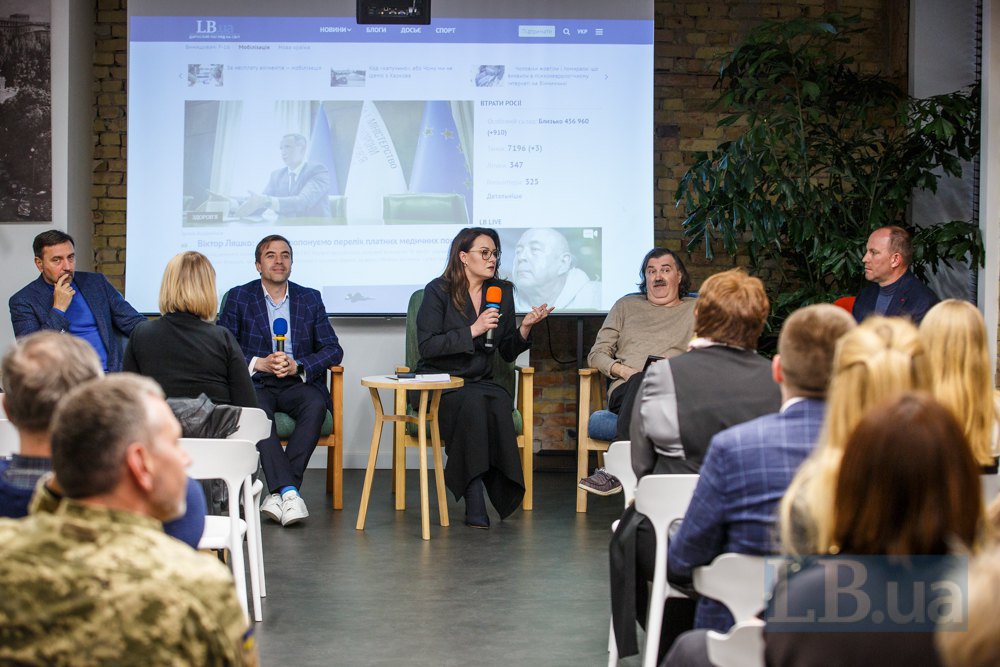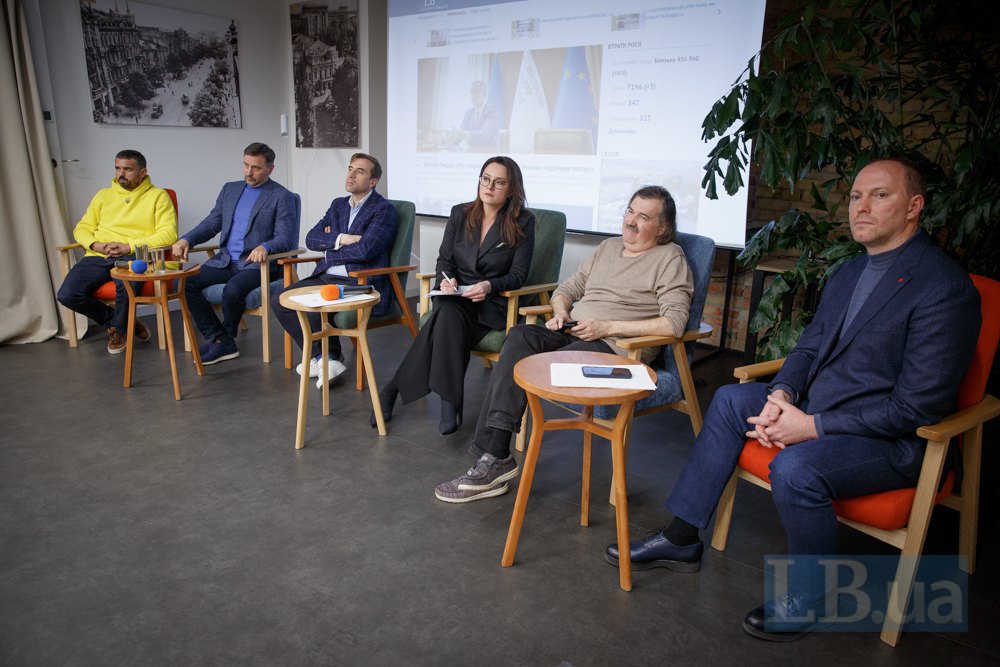
● Yuliya Svyrydenko, First Vice Prime Minister - Minister of Economy of Ukraine;
● Ihor Khyzhnyak, CEO of Comfy;
● Oleksandr Olshanskyy, President of Internet Invest Group Holding;
● Andriy Dlihach, founder and CEO of Advanter Group and international business community Board;
● Vyacheslav Lysenko, entrepreneur, public figure, co-owner of Meest China;
● Ihor Liski, Chairman of the Supervisory Board of EFI Group.
Pressure from the security forces: what the authorities say
During the discussion, the government was represented by Minister of Economy Yuliya Svyrydenko. In particular, she noted that there had been some progress over the past month: a bill lifting the ban on profits for defence companies was passed; the law "On BES" was voted on in the first reading; and the Pulse portal for business complaints about arbitrary actions by security forces was launched in test mode. In addition, the economic platform "Made in Ukraine" was launched to establish a dialogue with small and medium-sized businesses from the regions.
"I think we responded in time to the signals of pressure coming from business, and we are trying to keep track of all these things. From what I can see from communication with business, associations, and regions, there have been fewer complaints about the work of law enforcement agencies over the past two months. My subjective opinion is that there have been some positive changes over the past two months," the official said.
Business response
Representatives of the business community are less optimistic, although they acknowledge that there are some changes. However, they are currently pointed, not systemic, and do not relate to the work of law enforcement agencies.
Andriy Dlihach, CEO of Advanter Group and international business community Board, noted that since the NSDC's moratorium on tax audits of businesses was lifted, 47% of entrepreneurs have faced some form of pressure from law enforcement agencies in Ukraine. Almost every second.
"A significant part of it is the blocking of tax invoices, but not just any blocking. It is absolutely clear that not improving the system, but cleaning up the SMKOR system (a monitoring system designed to track questionable transactions of a taxpayer that could potentially be aimed at artificially reducing VAT liabilities - Ed.
Likewise, business does not believe in rebooting the BES without changes to the Criminal Procedure Code, without introducing the presumption of innocence of business and removing economic investigations from most authorities. Therefore, only systemic reform is needed," the businessman said.
According to him, in addition to forceful pressure, the problems include military risks, unpredictability of the state, lack of staff (this figure has already reached 25%) and financial resources (about UAH 300 billion and about $60 billion if we talk about recovery and development), low capacity utilisation (only 45%), and logistics. And only 2% of Ukrainian companies consider their financial and economic condition to be good, whereas before the large-scale aggression this figure reached 80%. Against this background, Andriy Dlihach believes that the government's efforts to simplify business are insufficient.
"We are afraid that all these councils are created rather for point decisions, for tactics and to say: we like Pulse as a tool (the Pulse service accepts appeals about illegal actions or inaction of tax authorities - Ed.) But we are convinced that this is a way to divert attention. That is why business continues to insist on systemic solutions," he said.
The CEO of Advanter Group also said that there was a "terrible discussion" in the business community about the advisability of signing a joint statement with the authorities - entrepreneurs did not trust the government's initiative and thought that the authorities would deceive them.
"But why did we do it? For us, it was a symbolic action to demonstrate that we know who we can work with in the government and hope that positive practices can be spread," the businessman explained.

Oleksandr Olshanskyy, President of Internet Invest Group, noted that 30% of companies are currently facing tax invoice blocking.
"That is, every third company has at least one blocked tax invoice within a month. Small or large, it doesn't matter," he said. According to him, the tax authorities falsify these statistics.
"It correlates the number of blocked tax invoices not to the number of companies that actually work, but to companies that are registered as VAT payers but have not filed any declarations for a long time. They have 250,000 registered taxpayers, of whom about 80 are still alive. The second way to falsify the data is to correlate the amount of money they have blocked with the amount of VAT in the country, rather than the number of companies that have had problems.
If every third company in the country "manipulates" VAT, then something is wrong either with the tax authorities or with VAT," Olshanskyy said.
Vyacheslav Lysenko, an entrepreneur, public figure and co-owner of Meest China, added to the case of the security forces with his company, which is currently classified as a risky one.
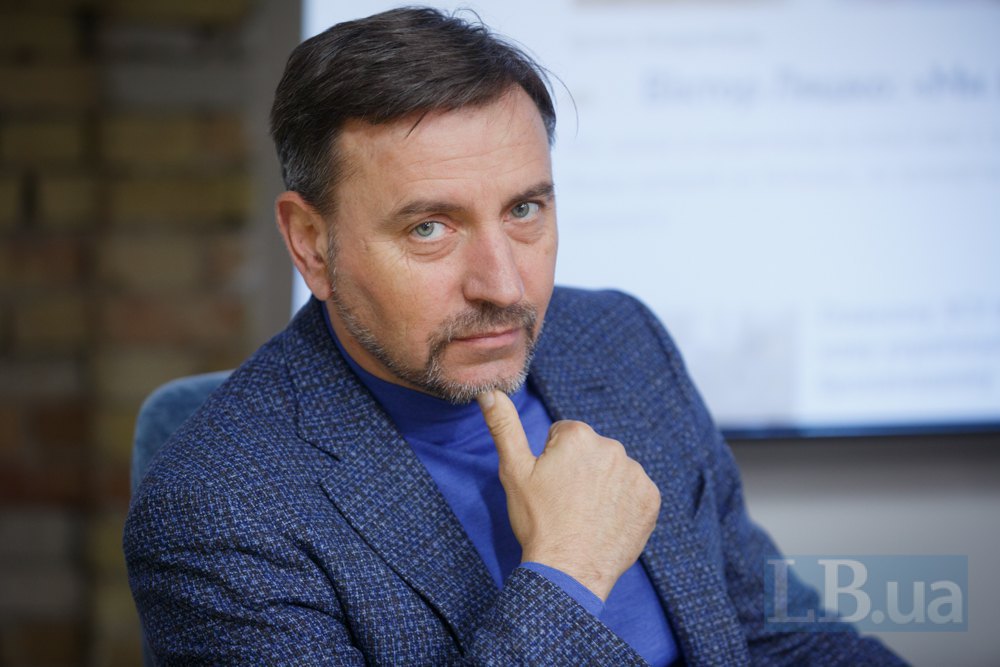
"I have a Ukrainian production facility, and it is at risk because we take raw materials - one code - and produce finished products - another code. So we are definitely cheating," Lysenko said.
He gave another example:
"I'm building a military plant at my own expense, which I hand over to the state for free. But I received a letter: "We suspect you of financing terrorism and weapons of mass destruction." I laughed at first. But my lawyer told me: "Well, they're right, if it's from the Russian government.
Comfy, a large chain of home appliances and electronics supermarkets, faced both the blocking of tax invoices and the assignment of the status of a risky enterprise, said the company's CEO, Ihor Khyzhnyak.
"103 stores, 23% market share, 4,500 employees. It is the only company in the segment that has been operating completely in the black for 15 years, the second largest player in e-commerce according to Forbes, a completely transparent company audited by the Big Four (for a long time it was Deloitte, now KPMG). And they assigned the status of a risky company," Khyzhnyak said.
And today the company has two criminal cases. And the tax authorities came the very next day after the moratorium on inspections was lifted.
"There is an act for almost 700 million from a scheduled audit that was not completed in 2022. The tax office had two weeks left and a full-scale invasion began. In December, as soon as the president cancelled the moratorium on inspections, the next day at 9am, the tax authorities were already at our place and actually issued an act for more than 700 million.
Now we have another audit - for five years, from 2015 to 2022, they are checking TP (transfer pricing - Ed.). In December or January, I don't remember, there were 27 scheduled inspections in stores across the country, where we were issued the same act, as if it were a copycat, which had nothing to do with the Comfy chain. The report was about the fact that we did not put all the money in the cash register, to put it simply. This is basically impossible, because Comfy does not work with cash and has never worked. And in the smoking room, the tax authorities told our employees that they had to discharge them, otherwise they would all go to war," said Ihor Khyzhnyak.
At the same time, there was no dialogue on how to raise more money for the budget.

"For the past four months, I have not been dealing with the company's budget, functional strategies, HR committees, and all the things that a CEO should do at the beginning of the year. I'm just looking for a dialogue and channels where I can be heard," said the Comfy CEO. He assured that he wants to develop the business and understands how to increase tax revenues in his industry, but he needs a move towards the state.
"I want to live in this country. I stayed, I am building a business, I am trying to invest in this country, I am trying to convince the owners that if you give me money, I will consolidate the market and open more stores. And in two years, Comfy paid 2 billion 150 million in taxes. This is 170 thousand FVP," Khyzhnyak said.
According to Ihor Liski, Chairman of the Supervisory Board of EFI Group, the only way to fix everything his colleagues have mentioned is to build trust between the government and business.
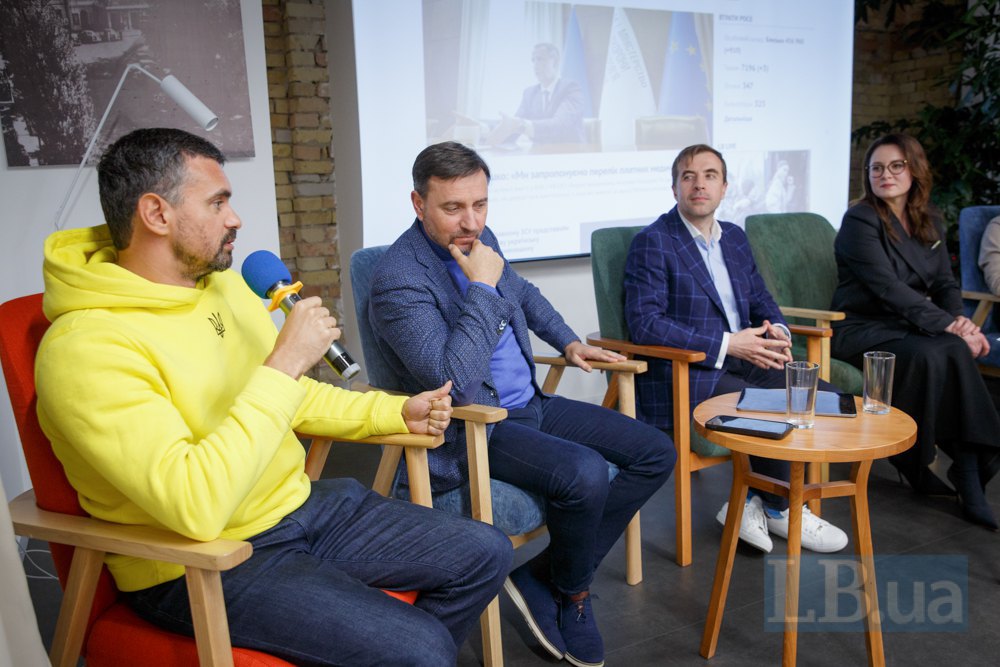
"Let's remember how the US, together with the UK and its allies, won World War II. How they developed new methods of air defence in 75 days. When business, the army and the state allocate money for development. Where is this trust? I want to hear the state come out and say: I have a billion hryvnias for the development of Ukrainian air defence, we believe in it. Why is this not happening?
Because there is no trust. The state has no trust in business because it thinks this money will be stolen. And business does not want to come. Do you think there is a queue to supply products to the Ministry of Defence? No, I don't. Because then they will come with searches for a penny and put everyone in jail," the businessman outlined the situation.
In his opinion, today the issue of trust is already a matter of state survival, as it concerns the Armed Forces, mobilisation, tax payments, etc.
"...The state must fight for the trust of entrepreneurs and win this fight. I will say a terrible thing: we may have to discuss tax increases very soon. How can we talk about increasing taxes in these conditions if we don't believe in the way they are collected or distributed? And this will be a much worse situation than with the mobilisation," Liski believes.
What business wants from the government
Ihor Liski, Chairman of the Supervisory Board of EFI Group, said that during the war, Ukrainian business felt the need for effective cooperation with the state. Just as the state needs paid taxes, entrepreneurs need financing, infrastructure, agreements with partners, etc. This cooperation needs to be built on mutual trust right now - the country has no time to think, the businessman said.
"We cannot wait for next year or the next election, which we may not live to see. This trust needs to be regained right now. We have no other chance to survive as a country," he said.
According to Andriy Dlihach, CEO of Advanter Group and international business community Board, the disconnect between the government and business is also due to the fact that the state exists in four dimensions in parallel: a state of security forces that actually sets policies; a liberal state; a bureaucratic state (what is called the deep state in America, in our country it is just bureaucrats) and a populist state.

"And when we are fighting against an abstract state, we keep running into the same people - we are forced to communicate with the liberal part, the pleasant part. Where is the other part?" said Dlihach. Because of this, business has always agreed to superficial reforms. And today, the businessman said, it demands substantive reforms:
- Introduction of total protection of property rights;
- economic freedoms (involving total privatisation, total deregulation, tax reform, radical customs reform, and working public procurement);
- a new social contract, so that business, people and government stop blaming each other and finding out who is bad;
- stop lying to international partners and become clear to them.
According to Dligach, the corruption rent in the country today is over UAH 600 billion. This is what the state budget does not receive. Economic reservation, the businessman believes, would bring in another 160 billion hryvnias.
"But the issue is not moving. Why? And here I think about the thesis of trust. The Ministry of Economy has shown both the best and the worst examples of inclusiveness. There are many good examples - 99% of them. For example, the development of a strategy for small and medium-sized businesses is an absolutely inclusive process. The inclusive process is the magic wand that is about trust. Because trust is born only through cooperation.
The draft law on the BES, which both business associations and think tanks tell the Ministry of Economy is not suitable, it does not take into account anything, is not. But we understand that this is not a draft law of the Ministry of Economy, it is forced to do so. And so we are in a constant stretch. The government and business will always have this problem of trust," the businessman believes.
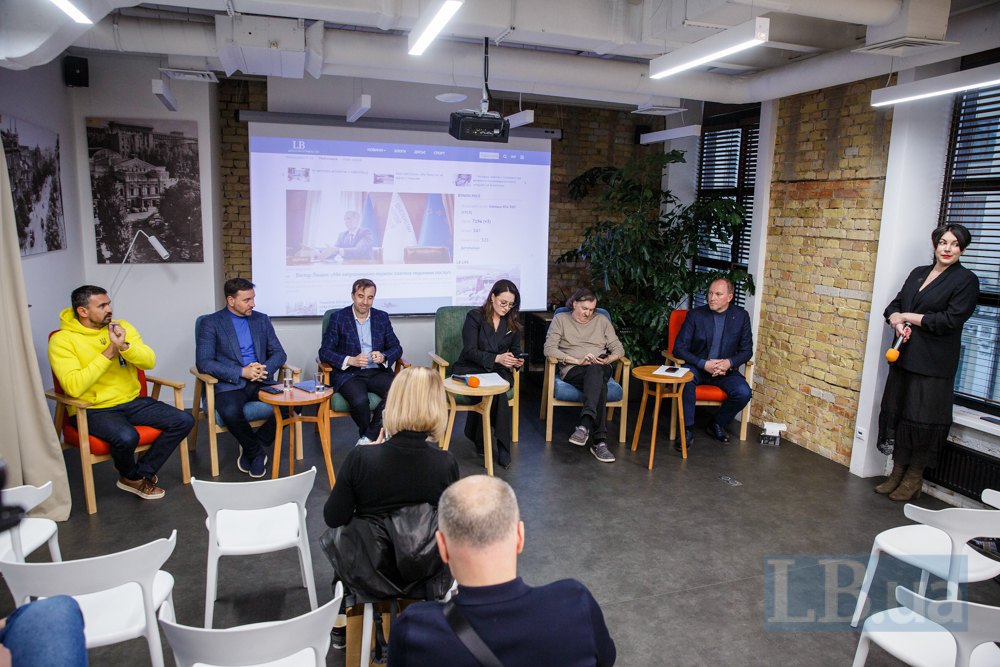
Vyacheslav Lysenko, co-owner of Meest China, is convinced that business needs "guarantees, investment security and transparent working conditions. This is a demand not only from Ukrainian entrepreneurs but also from foreign investors."
"I have met with foreign investors. They definitely want to invest in Ukraine after the war is over. They say it's problematic in China now. The local market has already been eaten up. But in Ukraine, every dollar invested now will triple in value in 10 years. Where can we find a place where we can earn 30% a year? Nowhere," said the businessman.
"I think everyone in their industry knows what needs to be done to increase taxes and create a level playing field. But we need to be heard. We have been knocking for many years, but we are told: wait, wait, wait," said Vyacheslav Lysenko.
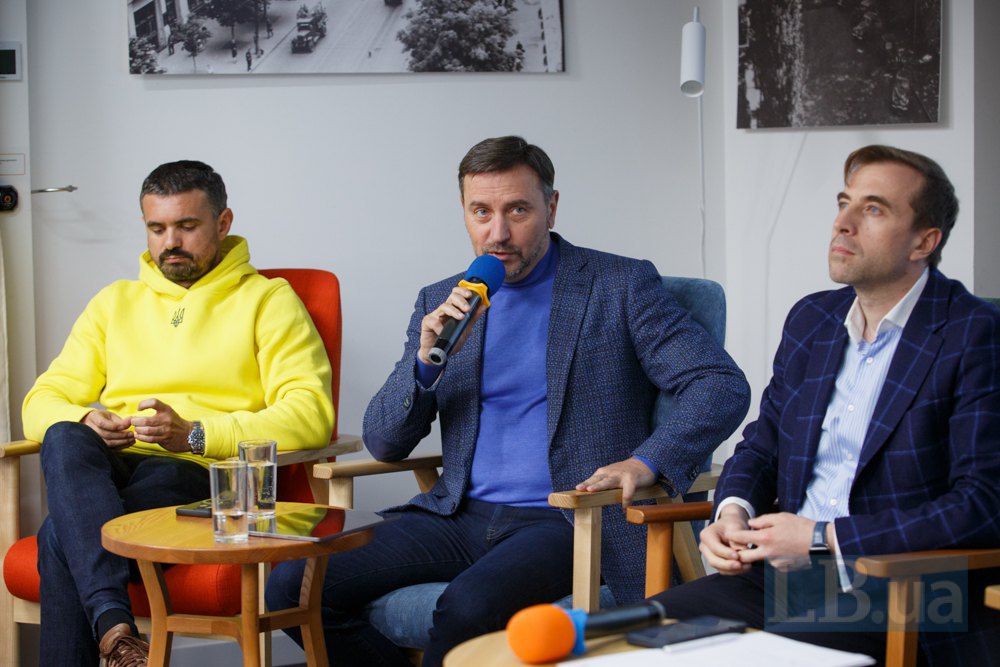
Ihor Khyzhnyak, CEO of Comfy, also spoke in favour of equal rules for all. He noted that in his industry alone, the state does not receive a huge amount of taxes. For example, today 75% of iPhones are imported to Ukraine in the black.
"Over three years, this is 10 billion hryvnias in unpaid taxes from one device. This is 700 thousand FVP," the businessman stated.
"If we don't lay down some principles for joining the European Union now, if we don't adopt civilised rules, when will we do it?" said Khyzhnyak.
Oleksandr Olshanskyy, President of Internet Invest Group, believes that the Verkhovna Rada should be the place to address problems in the interaction between the government and business.
"In every country in the world, power belongs to either elected representatives or security forces. There is no other distribution. There is only one indicator - the immunity of elected officials. On the day when the Verkhovna Rada voted to lift the immunity of MPs, it transferred power from its hands, the hands of elected representatives of the people, to the hands of security forces. We elected them to protect us from arbitrariness. How can they protect us from anything if they are unable to protect themselves?" Olshanskyy asked.

In his opinion, deregulation, tax changes, fair courts - everything is tied to the parliament.
"The Verkhovna Rada will still be at the end of this chain. It was the Verkhovna Rada that wrote the laws that are being implemented. It is the Verkhovna Rada that can pass anything with 300 votes," Olshanskyy stressed.
Therefore, the restart of the Verkhovna Rada to make it fully operational is also among the requests of business. However, the panelists did not specify how to do this during the war, when it is impossible to hold elections.
For her part, Minister of Economy Yuliya Svyrydenko noted that she is the biggest advocate of the government in business.
"If the issue of booking is economic, I am a supporter of this story. The issue of reducing the pressure of law enforcement, deregulation, simplification - this is for me. But when business says that we are still not satisfied, I would say that I also have complaints. Because no one wants to come to power. No one wants to work in the Ministry of Economy or the Ministry of Finance. Because you are a lifelong PEP, your children are PEPs. My child is a PEP. She doesn't know what it means, but she is already a PEP.
The second aspect is that business and the community put pressure on your activities, even if you are motivated by the purest thoughts, you want to help, deregulate, simplify, reduce pressure," she explained.
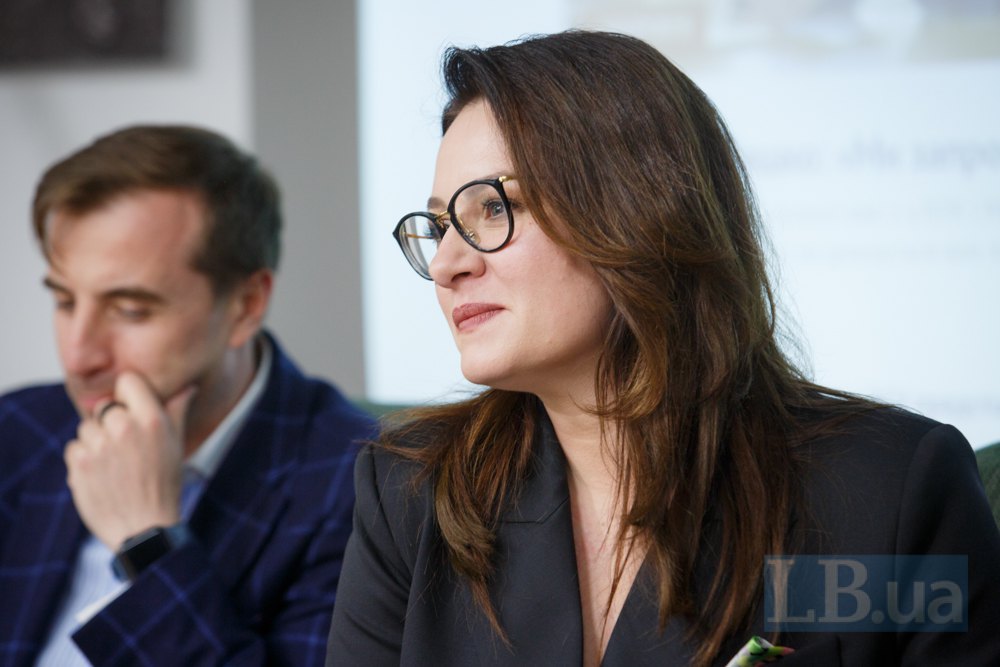
At the same time, Svyrydenko stressed that at least the liberal part of the government is ready to contribute to the development of Ukrainian entrepreneurship as much as possible, ready to strengthen cooperation.
According to her, today there are already a dozen state instruments to support entrepreneurs: 5-7-9, grants of up to UAH 8 million for processing, cashback for agricultural machinery, a mortgage programme, stimulation of non-resource exports by the ECA, military risk insurance, investment incentives, etc.
"I believe that Ukrainian business is the backbone of our economy. It is the basis of defence capability. And we, on the contrary, support those who pay taxes in every way possible, we note this... The taxes paid by businesses go to support the army. We are at war. Obviously, we need to accumulate more revenues to be able to mobilise resources, pay salaries and buy weapons. That is why we have set a course to support Ukrainian producers by all means and means," the Minister of Economy said.
